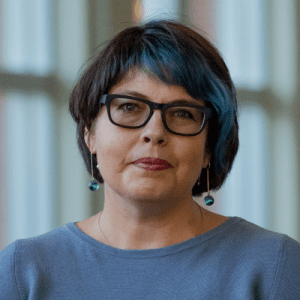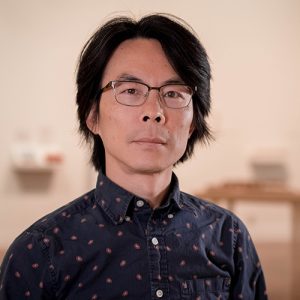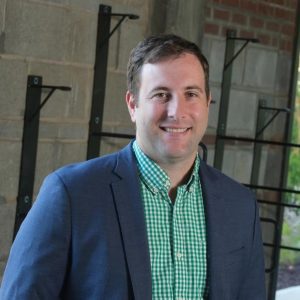Master of Urban Design
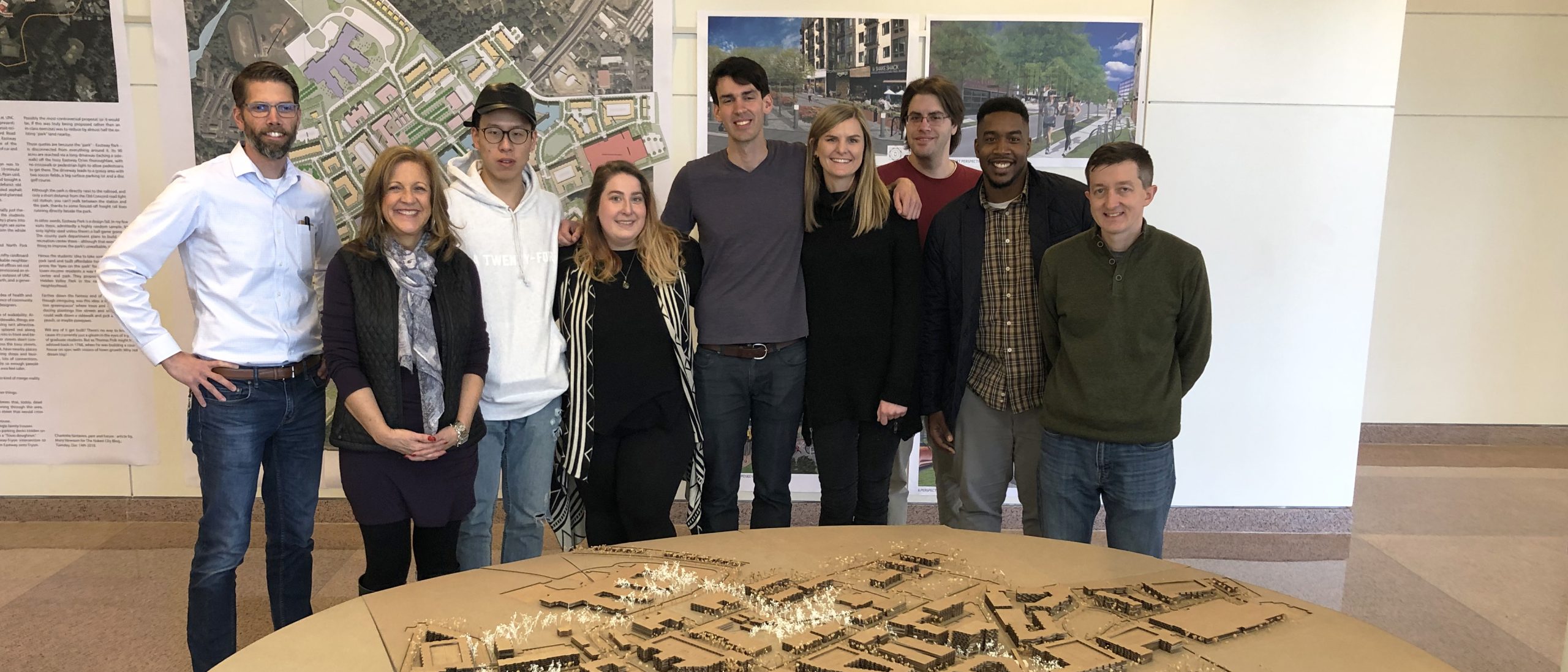
PROGRAM OVERVIEW
The Master of Urban Design (MUD) program at UNC Charlotte has established itself as an important training ground for aspiring leaders seeking to explore innovative design, applied research, and transformative policies and implementation strategies in building sustainable cities and livable neighborhoods across the region. As urbanization profoundly shapes the human experience both materially and socially, urban design continues to evolve as a dynamic and interdisciplinary field. We are dedicated to equipping our students with a comprehensive skill set by fostering collaborative inquiries that integrate architecture, urban planning, landscape architecture, real estate, and engineering. Through active engagement with Charlotte communities, we cultivate a learning environment that prioritizes the creation of sustainable and equitable urban environments.
The School of Architecture’s City.Building.Lab is a hub for action-based research and community engagement in the area of urban design. The City.Building.Lab (CBL) is the public outreach and research arm of the Master of Urban Design Program located at UNC Charlotte’s Dubois Center in the heart of Uptown Charlotte. CBL foregrounds common research interests of its affiliated faculty members focused on the ways that cities are shaped over time. It simultaneously encompasses a wide range of initiatives while also supporting the University’s urban research mission.
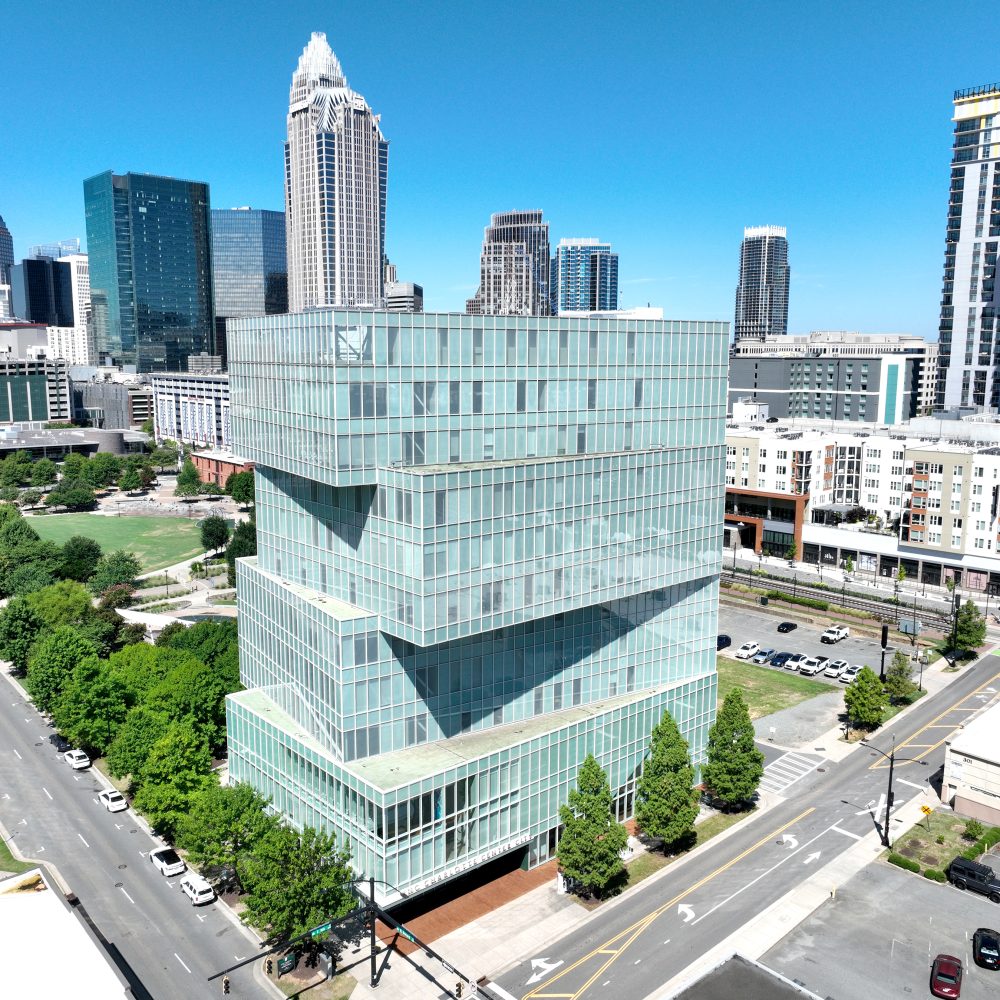
Our City
The reimagined program begins with the city of Charlotte – a city experiencing rapid growth, increased density, and expansion of its public transit system.
As the home to the national headquarters of many companies in the banking, manufacturing, energy, and financial services sectors, the city is also home to deep disparities in wealth, socio-economic mobility, and environmental justice. Charlotte has become an ideal laboratory for gaining a deeper understanding of urban design interventions in creating vibrant, resilient and memorable urban places.
Our Involvement
The urban design program folds Charlotte’s urban challenges into the core of its design pedagogy. Our studio-based classes focus on both tactical insertions within urban ecosystems and high-level master planning solutions.
Program faculty and students actively engage with community stakeholders through our design studios, community planning workshop course, and other coursework that closely aligns with research work by affiliated faculty in City Building Lab.
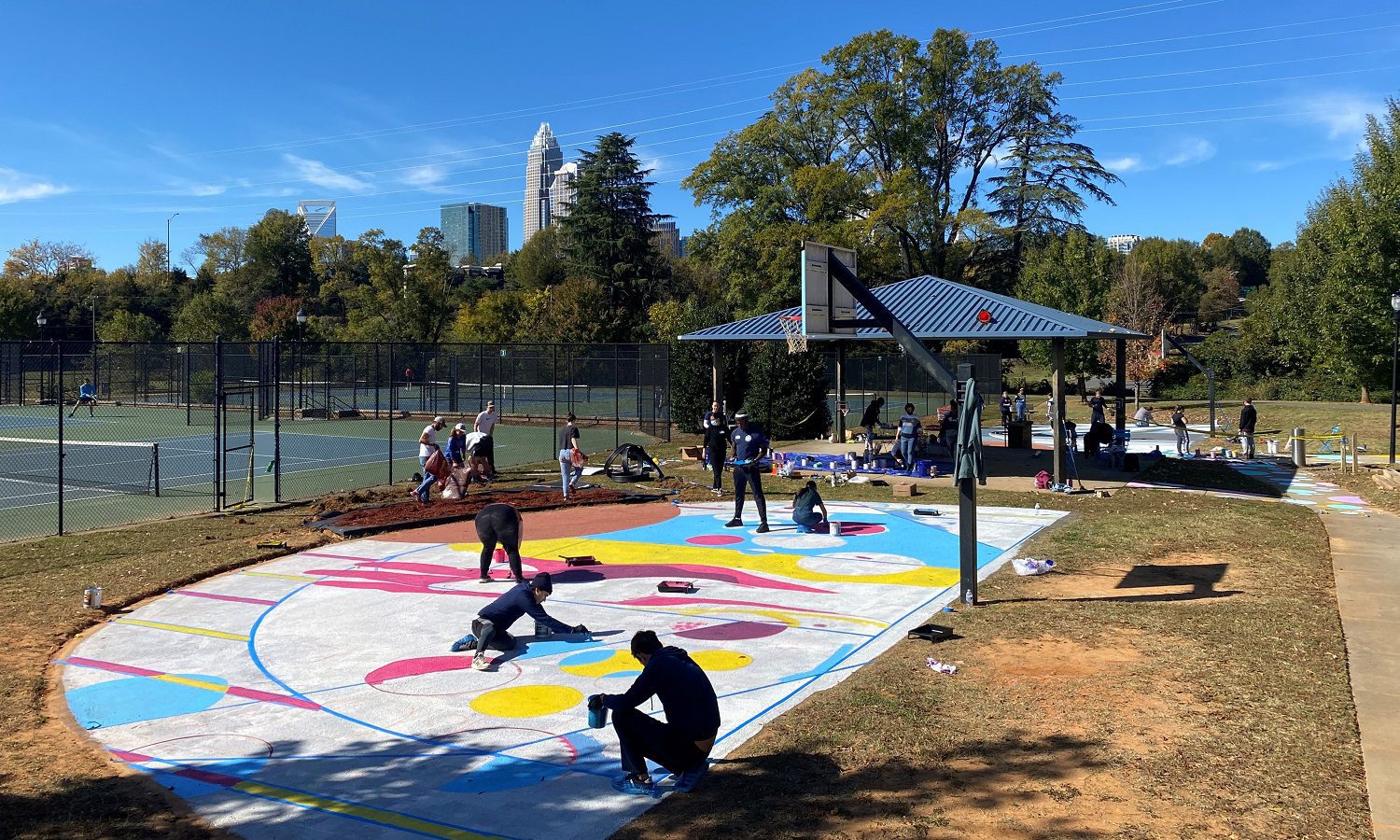
Urban Technology
Focused on envisioning the future, our urban design program sits at the intersection of data analytics and urban design with the goal of training professionals capable of creatively and technically leveraging computational tools in design processes. The program develops an innovative curriculum to introduce our students to modern analytical and visualization technologies, such as Geographic Information System (GIS), Extended Reality (XR), 3D Procedural Modeling, Geodesign, and Scenario Analysis to enable our students to better understand, design, and serve our cities.
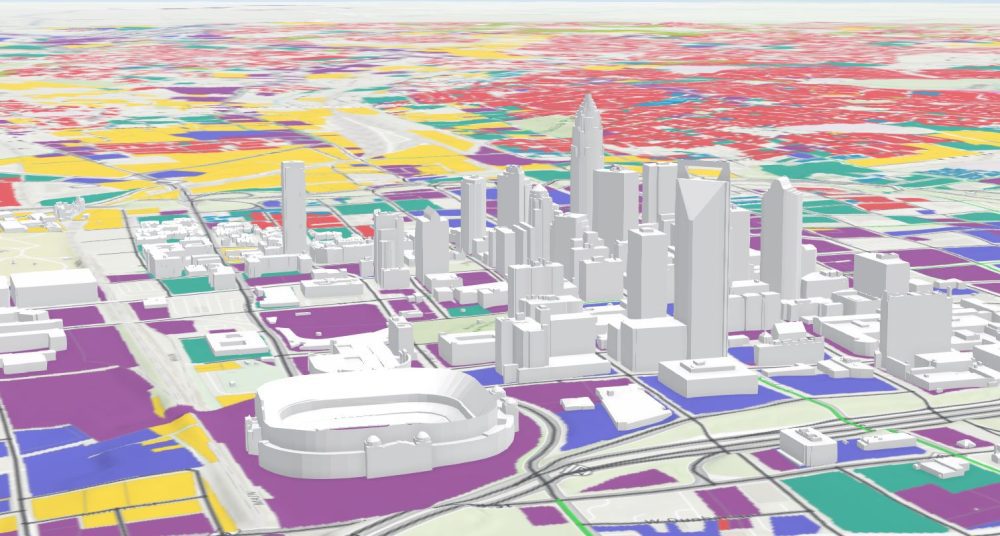
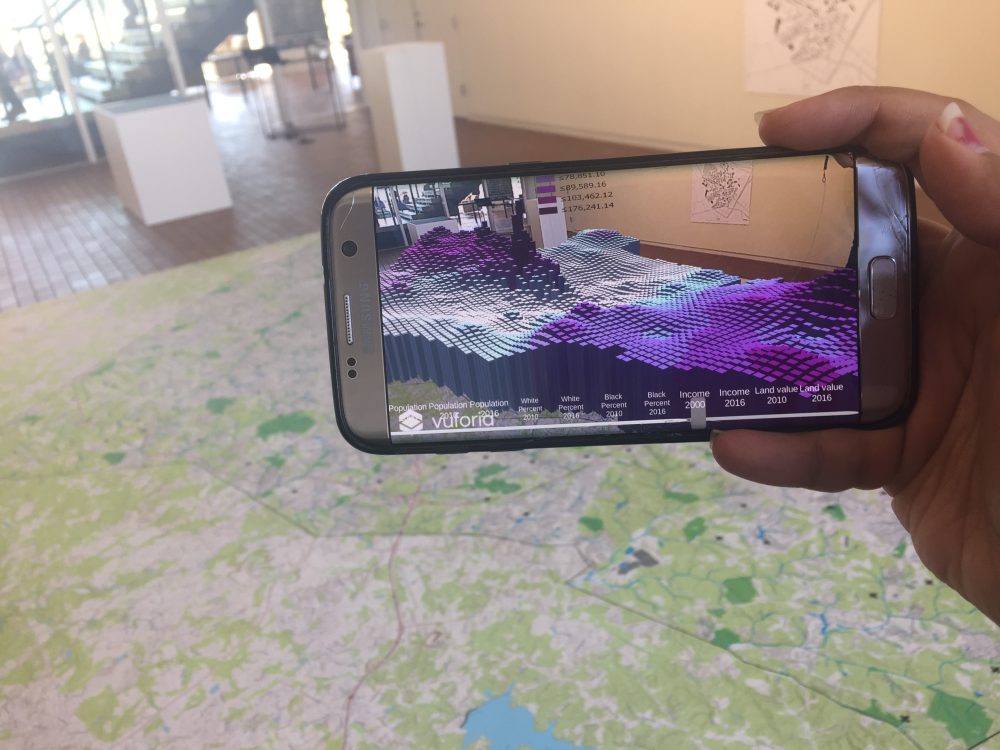
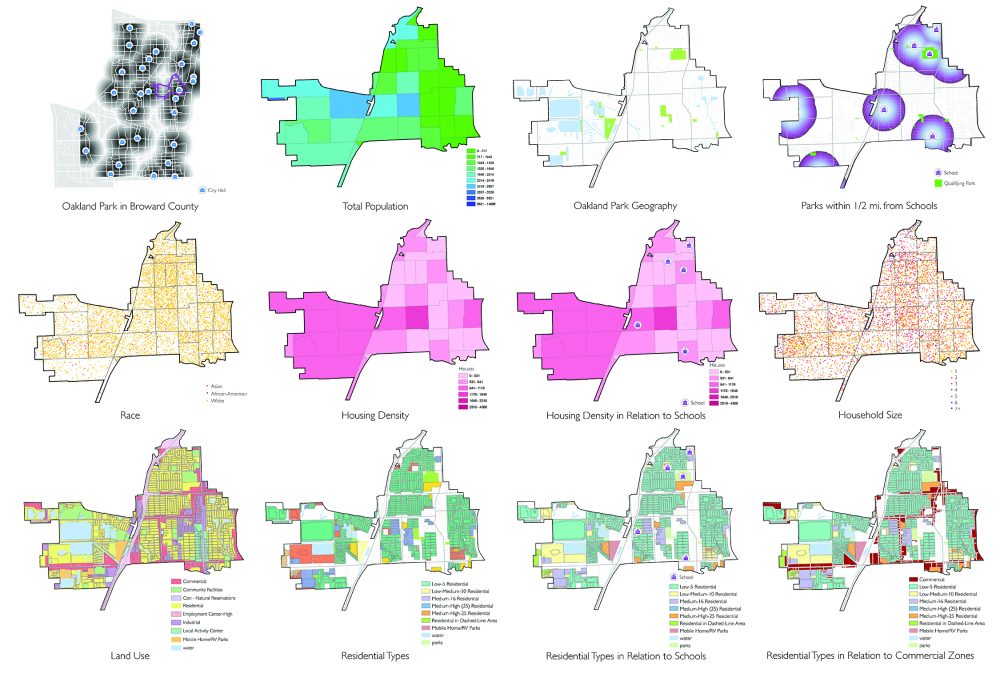
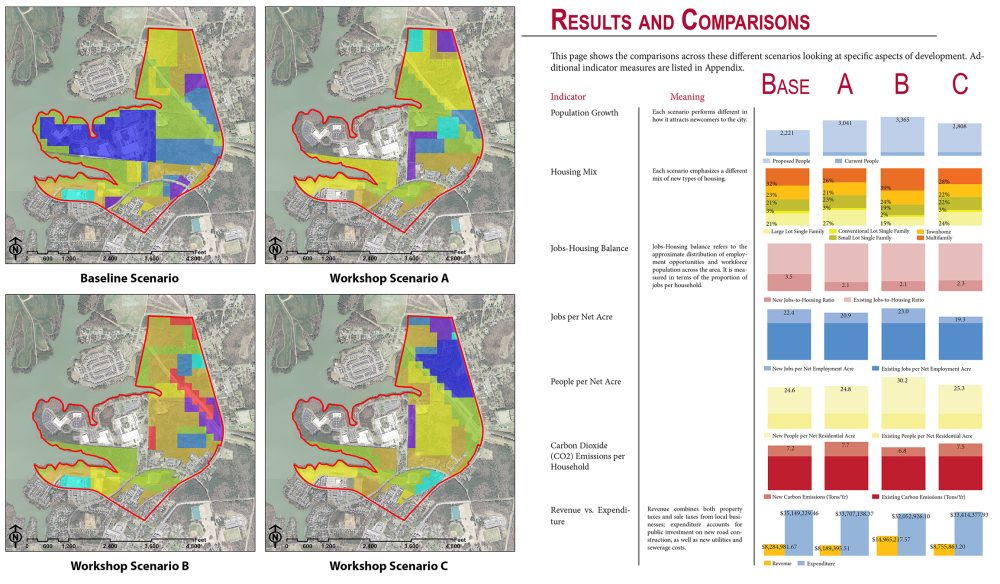
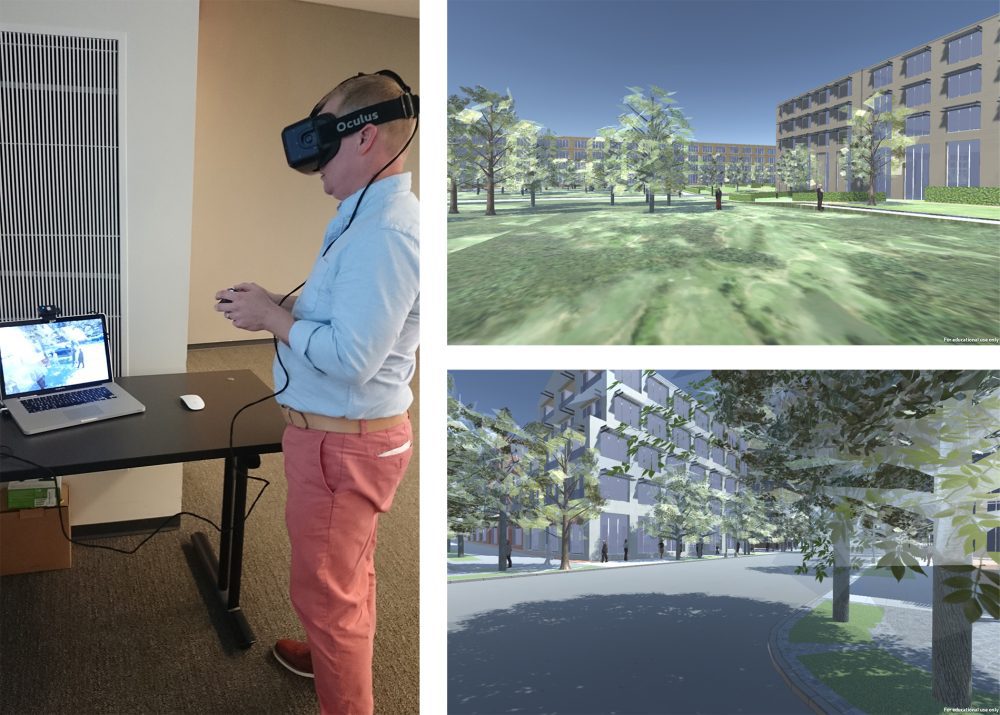
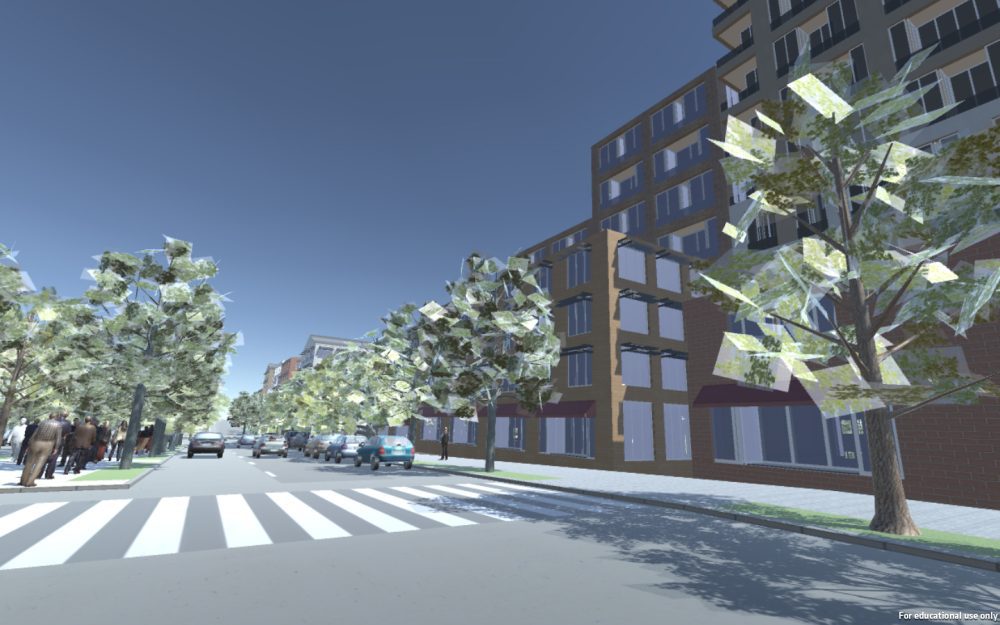
Studio Spotlight (Student work)
Click each of the images below to see examples of full projects completed by students in different courses throughout the program.






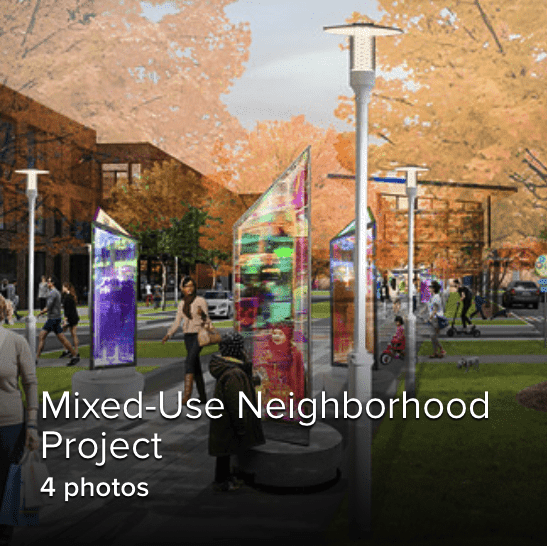
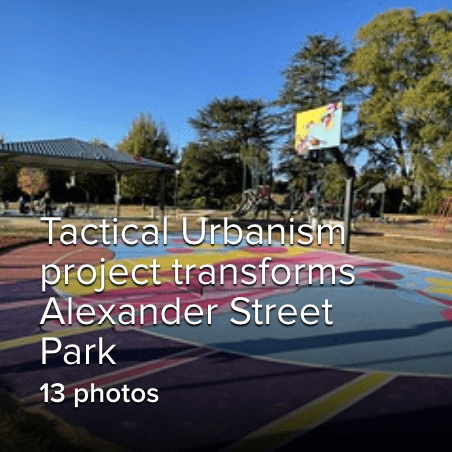

Career Outlook
Charlotte is home to more than 30 design offices offering services in urban design and community planning, including Charlotte Urban Design Center (a division of City of Charlotte’s Planning, Design, & Development Department), Bolton & Menk, Gensler, HDR, HOK, Morris & Berg, Neighboring Concepts, Shook Kelley, Urban Design Partners, and many more.
Our graduates are prepared to work across a diverse spectrum of positions in the urban design field within public and private sectors. You can find our alums working at large or small design offices and municipal agencies across the Charlotte region.

Program Manager of the Charlotte Urban Design Center

Architect at Studio G Architects, Inc. Boston, MA

Urban Designer for Lake Flato Architects in Austin, TX

Associate Urban Designer and Planner with the City of Charlotte
Admissions
See our Graduate Admissions page for information about graduate admissions to the School of Architecture, including specifics for international students and answers to frequently asked questions.
DEGREE REQUIREMENTS
The curriculum of the 36-credit Master of Urban Design program is delivered within a calendar year (fall-spring-summer). It is primarily studio-based with a solid grounding in design history and theory, mapping and visualization technologies, and electives that round out the student experience. Primary instruction takes place at The Dubois Center at UNC Charlotte Center City in uptown Charlotte, the city’s center of urban activity. The required study-abroad summer course in the final semester introduces a global perspective to the Charlotte-centered curriculum.
Master of Urban Design (36 Credit Hours)
Fall (12 credits)
- MUDD 6601 – Modern City (3)
- MUDD 6606 – GIS and Urban Mapping (3)
- MUDD 6101 – Urban Design Studio I (6)
Spring (12 credits)
- MUDD 5601 – Community Planning Workshop (3)
- MUDD 6050 – Elective (3)
- MUDD 6102 – Urban Design Studio II (6)
Summer (12 credits)
- MUDD 7120 – International Study (6)
- MUDD 7102 – Urban Design Studio III (6)
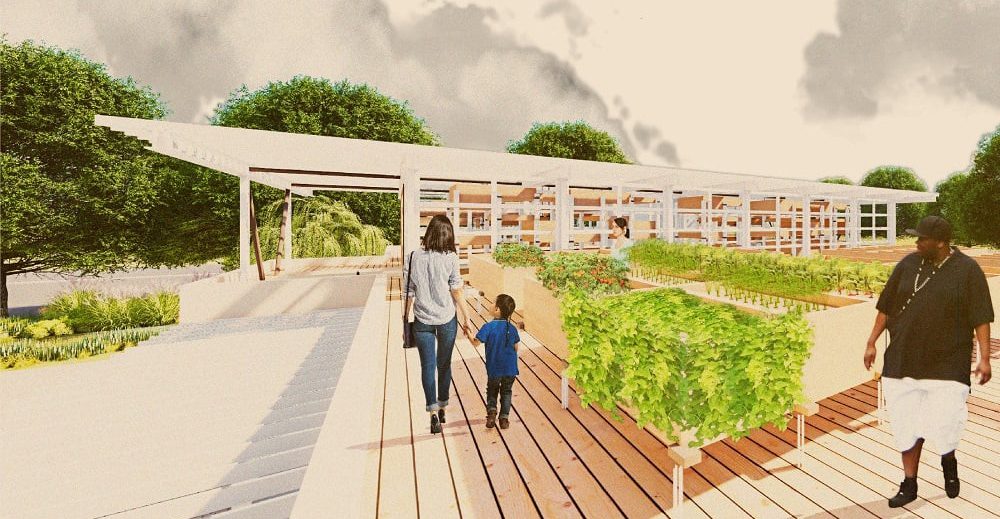
Dual Degree Options
Students may also elect to pursue a dual degree with a Master of Architecture or the MS in Architecture – Critical Heritage Studies. More information can be found at SoA Graduate Dual Degrees. Further dual-degree options with a Master of Art in Geography (Community Planning track) or a Master of Science in Real Estate are also possible. Applicants interested in a dual degree should apply separately to each program. Please check our frequently asked questions section below and visit our Graduate Admissions page for more information about the application requirements and process. Options include:
MUD / Master of Architecture
Any of the three Master of Architecture concentrations can be combined with the Master of Urban Design; however this dual degree works best for students in the MArch I or II concentrations. This combination links a professional design degree with a specialized degree focused on urban scale interventions to create meaningful public space for communities, neighborhoods, and cities.
For more information see the UNC Charlotte Graduate Catalog.
The Graduate Program Directors for both the MArch, Dr. Mona Azarbayjani, and MUD, Dr. Ming-Chun Lee, will guide dual degree students to keep them on track for both programs; however, typical plans of study could look like the following for each MArch track:
PLAN of STUDY: MArch Advanced Standing / MUD – 64 credits
When completed together, a specified 9 credits of the 40-credit MArch Advanced Standing and specified 3 credits of the 36-credit Master of Urban Design are waived as per the UNC Charlotte catalog, for a 64-credit dual degree.
Summer 1 (10 Credit hours)
- ARCH 7101 – Design Build Studio (6)
- ARCH 6500 – Follow Up (4)
Fall 1 (15 Credit Hours)
- MUDD 6606 – GIS and Urban Mapping (3)
- ARCH 5305 – Building Systems Integration (3)
- ARCH 7201 – Research and Design Methods (3)
- ARCH 7103 – Integrated Studio (6)
Spring 1 (12 Credit Hours)
- MUDD 5601 – Community Planning Workshop (3)
- ARCH 5206 – Professional Practice (3)
- ARCH 7104 – Diploma Studio (6)
Fall 2 (9 credit hours)
- MUDD 6601 – Modern City (3)
- MUDD 6101 – Urban Design Studio I (6)
Spring 2 (6 credit hours)
- MUDD 6102 – Urban Design Studio II (6)
Summer 2 (12 credit hours)
- MUDD 7120 – International Study (6)
- MUDD 7102 – Urban Design Studio III (6)
64 Total Credit hours
PLAN OF STUDY: MArch II / MUD – 78 credits
When completed together, a specified 9 credits of the 60-credit MArch II and specified 3 credits of the 36-credit Master of Urban Design are waived as per the UNC Charlotte catalog, for a 78-credit dual degree.
Fall 1 (15 Credit Hours)
- ARCH 5203 – Architectural History III (3)
- students with a BA in Architecture from UNC Charlotte that have taken ARCH 4203 should take MUDD 6601 – Modern City
- ARCH 5604 – Computational Methods (3)
- students with a BA in Architecture from UNC Charlotte that have taken ARCH 4604 should take ARCH 6306 – Tech Topics instead
- MUDD 6606 – GIS and Urban Mapping (3)
- ARCH 7101 – Topical Design Studio (6)
Spring 1 (12 Credit Hours)
- ARCH 5204 – Architectural History Topic (3)
- ARCH 5605 – Computational Practice (3)
- students with a BA in Architecture from UNC Charlotte that have taken ARCH 4605 should take ARCH 6306 – Tech Topics instead
- ARCH 6306 – Technology Topic (3)
- MUDD 5601 – Community Planning Workshop (3)
Fall 2 (6 credit hours)
- MUDD 6101 – Urban Design Studio I (6)
Spring 2 (6 credit hours)
- MUDD 6102 – Urban Design Studio II (6)
Summer 2 (12 credit hours)
- MUDD 7120 – International Study (6)
- MUDD 7102 – Urban Design Studio III (6)
Fall 3 (12-15 credit hours)
- MUDD 6601 – Modern City (3)
- ARCH 5305 – Building Systems Integration (3)
- ARCH 7201 – Research and Design Methods (3)
- ARCH 7103 – Integrated Studio (6)
Spring 3 (12 credit hours)
- ARCH 6306 – Technology Topic (3)
- ARCH 5206 – Professional Practice (3)
- ARCH 7104 – Diploma Studio (6)
78 Total Credit hours
PLAN of STUDY: MArch I / MUD – 114 credits
When completed together, a specified 9 credits of the 96-credit MArch I and specified 3 credits of the 36-credit Master of Urban Design are waived as per the UNC Charlotte catalog, for a 114-credit dual degree.
Fall 1 (15 Credit Hours)
- ARCH 5201 – Architectural History I (3)
- ARCH 5601 – Materials (3)
- ARCH 6602 – Representation II (3)
- ARCH 6101 – Design Studio (6)
Spring 1 (15 Credit Hours)
- ARCH 5202 – Architectural History II (3)
- ARCH 5602 – Environmental Systems (3)
- ARCH 6603 – Representation II (3)
- ARCH 6102 – Design Studio (6)
Fall 2 (15 Credit Hours)
- ARCH 5203 – Architectural History III (3)
- ARCH 5604 – Computational Methods (3)
- MUDD 6606 – GIS and Urban Mapping (3)
- ARCH 7101 – Topical Design Studio (6)
Spring 2 (15 Credit Hours)
- ARCH 6306 – Technology Topic (3)
- ARCH 5605 – Computational Practice (3)
- MUDD 5601 – Community Planning Workshop (3)
- ARCH 7102 – Topical Design Studio (6)
Fall 3 (6 credit hours)
- MUDD 6101 – Urban Design Studio I (6)
Spring 2 (6 credit hours)
- MUDD 6102 – Urban Design Studio II (6)
Summer 2 (12 credit hours)
- MUDD 7120 – International Study (6)
- MUDD 7102 – Urban Design Studio III (6)
Fall 3 (15 credit hours)
- MUDD 6601 – Modern City (3)
- ARCH 5305 – Building Systems Integration (3)
- ARCH 7201 – Research and Design Methods (3)
- ARCH 7103 – Integrated Studio (6)
Spring 3 (15 credit hours)
- ARCH 6306 – Technology Topic (3)
- ARCH 5204 – Architectural History Topic (3)
- ARCH 5206 – Professional Practice (3)
- ARCH 7104 – Diploma Studio (6)
114 Total Credit hours
MUD / MS in Architecture Critical Heritage Studies
The Master of Science in Architecture with a concentration in Critical Heritage Studies can be combined with the Masters of Urban Design. The Heritage / Urban Design combination allows students to focus on community engaged research and design to improve neighborhoods and cities through thoughtful practice that builds on history and a sense of place. For MUD students, doing this combination can add as little as one semester to their curricular path and result in two degrees with minimal added investment.
The Graduate Program Directors for the MS in Architecture, Dr. Emily Makas, and for MUD, Dr. Ming-Chun Lee, will guide dual degree students to keep them on track for both programs; however, typical plans of study could look like the following:.
PLAN OF STUDY: MS Architecture – Critical Heritage Studies / Master of Urban Design
When completed together, a specified 6 credits of the 36-credit Master of Urban Design and specified 9 credits of the 30-credit MS in Architecture Critical Heritage are waived as per the UNC Charlotte catalog, for a 51-credit dual degree.
Fall 1 (12 Credit Hours)
- ARCH 5600 – Critical Approaches to Heritage (3)
- MUDD 6606 – GIS and Urban Mapping (3)
- MUDD 6101 – Urban Design Studio I (6)
Spring 1 (15 Credit Hours)
- ARCH 7211 – Research Lab (4)
- ARCH 6600 – Heritage Colloquium (2)
- MUDD 5601 – Community Planning Workshop (3)
- MUDD 6102 – Urban Design Studio II (6)
Summer 1 (12 credits)
- MUDD 7120 – International Study (6)
- MUDD 7102 – Urban Design Studio III (6)
Fall 2 (12 credit hours)
- Heritage Elective (3)
- HIST 6320 – Historic Preservation (3)
- ARCH 6400 – Heritage Internship (3)
51 Total Credit hours
Frequently Asked Questions
HOW DO I APPLY?
The application can be accessed through the UNC Charlotte Graduate School website. If you are considering applying, you should start your application at this link early so that you can request letters of recommendation through the automated system. We cannot review an application that is not complete and those letters are often the final pieces that we receive.
IS IT POSSIBLE TO HAVE THE APPLICATION FEE WAIVED?
No, we are not able to waive the application fee.
WHAT SEMESTER CAN I START THE PROGRAM?
The Master of Urban Design is a highly structured one-year program that requires all students to follow the same schedule of courses in sequence. As such, all students must begin in the Fall semester.
If you have an undergraduate degree in architecture or landscape architecture, you would start our program in the fall semester and should indicate that on your application.
If you do not have an undergraduate degree in architecture or landscape architecture, you will start the program in the summer as you will be required to participate in MUDD 5101 – Design Studio: Basics during the second summer session before the start of the fall semester. That course typically starts immediately after the July 4th holiday and introduces students to the software, vocabulary, and design thinking that will allow them to start the full-time program successfully in the fall. If you do not have a design degree, be sure to indicate a summer start on your application for admission.
WHAT DOES “PRIORITY APPLICATION DEADLINE” MEAN?
The MUD program accepts students into the program on a rolling basis until the program is full. That means an application can be submitted in May or June for a July or August start and if there is space, that applicant would still be considered for admission.
Applicants are encouraged to apply by the January 15 priority application deadline if they want to be considered for research and teaching assistantships or other support. We will distribute those funds early so there is not likely to be anything available for later applicants.
IS THE GRE REQUIRED FOR ADMISSIONS?
No. The Graduate School at UNC Charlotte is no longer requiring the GRE as part of the admissions process. You do not need to submit test scores.
WHAT ARE THE ENGLISH LANGUAGE TEST REQUIREMENTS?
The Graduate School at UNC Charlotte requires proof of English language proficiency from applicants whose native language is not English. For more information, including tests accepted and minimum scores, see this page about language proficiency on the Graduate School website.
IS THERE A SEPARATE SCHOLARSHIP OR ASSISTANTSHIP APPLICATION?
No. All applicants will be automatically considered for all School of Architecture admissions scholarships, teaching assistantship, and research assistant positions. There is no separate application and no need to reach out to faculty directly about positions. As part of the application review process, applicants will be considered for these support opportunities.
Our assistantships are competitive and we typically only have a small number of tuition awards to offer to our strongest applicants. These only cover the in-state portion of tuition. Students are still responsible for the out of state portion of tuition and the fees. You can find information about tuition and fees at this link. The published numbers are for the current academic year, so these will likely change in future years.
ARE THERE LATER OPPORTUNITIES FOR SCHOLARSHIPS IN SOA?
Yes! Every spring semester, the School of Architecture issues a call for scholarship applications. Urban Design students are eligible for some of these opportunities and may apply to receive funding. Most of these awards are around $1,000 and would go to your final summer expenses.
IS THE MUD PROGRAM AT UNC CHARLOTTE STEM-DESIGNATED?
No. The Urban Design program at UNC Charlotte’s School of Architecture is not STEM-designated. Our Master of Architecture program is STEM-designated and we offer a dual degree opportunity for students who are interested in staying longer and completing two master’s degrees.
WHAT IS EXPECTED IN THE APPLICATION PORTFOLIO?
Please, see the portfolio description under “Admission Requirements” here. We are especially interested in seeing process and exploratory work in addition to renderings of completed design projects.
If you have no visual/graphic skills (sketches, drawings, photography, artwork, mapping, diagrams, visual analysis) your application will not be strong and you should consider taking a drawing course or a photoshop course to help generate material for a portfolio.
ARE GRADUATES OF MUD ELIGIBLE TO APPLY FOR OPTIONAL PRACTICE TRAINING (OTP)?
WHAT SUPPORT IS AVAILABLE TO INTERNATIONAL STUDENTS SEEKING TO GAIN A US VISA?
The UNC Charlotte International Student and Scholars Office (ISSO) is a key contact for all international students and applicants with questions related to visas, I-20s, and financial certification. Please, review the FAQ section on their website.
IS THE SUMMER TRAVEL PROGRAM REQUIRED?
Yes. All students are required to participate in the 5-week foreign study program in their final summer of the MUD program. This is an integral part of the educational sequence. Students should anticipate costs, passport and visa, and other concerns in advance.
IS IT POSSIBLE TO COMPLETE THE MUD PROGRAM PART-TIME?
Yes. It is possible to complete the MUD program part-time. Please, review the Part-Time MUD Option in the university’s course catalog. Students have found it difficult to work full time when enrolled in the one-year studio sequence.
WHAT SKILLS, SOFTWARE, OR TUTORIALS SHOULD I BE FAMILIAR WITH BEFORE STUDYING URBAN DESIGN?
Hand drawing or sketching is a key tool for designers, both as a way of recording observations and of really seeing the city. You may or may not have any experience with sketching spaces and buildings and the environment around you. Whether you are a beginner or experienced, this is something you could always work on to hone your skills. Getting into a regular routine of sketching every day will improve your hand and your ability to understand and analyze the built environment.
We strongly recommend becoming familiar with the following software:
- Adobe Creative Cloud Photoshop
- Adobe Creative Cloud Illustrator
- Adobe Creative Cloud InDesign
- Sketchup Pro
- Rhinoceros
Questions?
For more information, contact the MUD Graduate Program Director, Dr. Ming-Chun Lee. Faculty researching, teaching, and mentoring students in the Urban Design program include:
